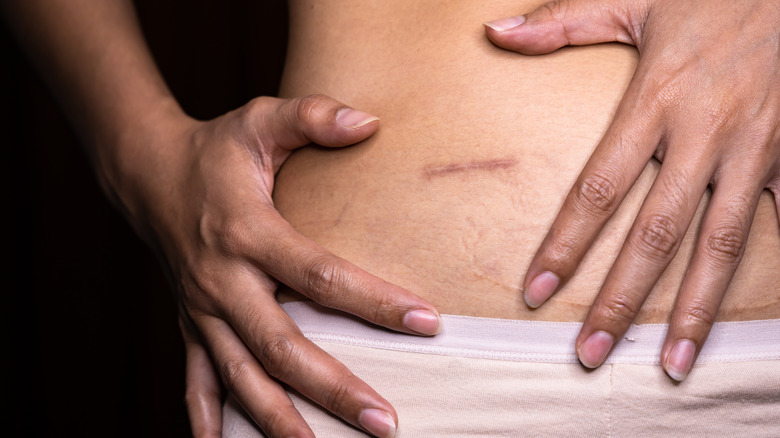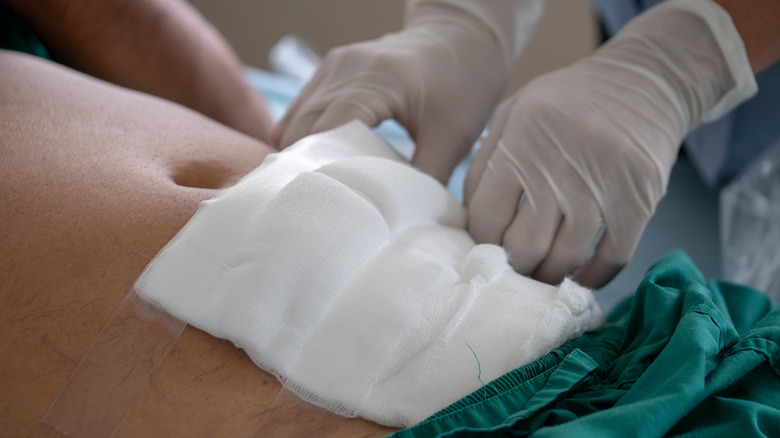What To Expect After An Appendectomy
An appendectomy is a type of surgery where the appendix is removed, per Johns Hopkins Medicine. The procedure is a common emergency surgery that is typically performed when the appendix is infected. You've probably heard of appendicitis, the medical term for when the appendix becomes infected and swelling. If appendicitis goes untreated, the appendix can burst in as little as 48 hours and result in a life-threatening prognosis. For this reason, it is vital to have appendicitis treated immediately.
According to Mount Sinai, the appendix is a finger-shaped, small organ situated within the first portion of the large intestine. Unless you develop appendicitis, you may never even notice your appendix. Appendicitis may begin as pain in your lower abdomen — particularly on the right side — that can be mild, sharp, severe, or throbbing. When you see your healthcare provider or go to the emergency room, you'll likely be sent to radiology for an ultrasound or CT scan to ascertain the state of the appendix. If appendicitis is detected, you may be scheduled for an emergency appendectomy.
Once you undergo an appendectomy, you might wonder about the recovery process or how much assistance you will need from family or friends. While each person's experience with an appendectomy is unique and your doctor will give you information on the next steps, here is what you can generally expect.
Transitioning from hospital to home
After having an appendectomy, you'll likely stay in the hospital for 24 to 48 hours after surgery, although your doctor may ask for you to stay longer (per Mount Sinai). There are two types of appendectomies: open appendectomy, which requires a larger open incision in your lower right abdomen, and laparoscopic appendectomy, which involves one or more small incisions, according to Johns Hopkins Medicine. The time you spend in the hospital will depend on the type of appendectomy you undergo, and laparoscopic appendectomies can sometimes be performed in an outpatient procedure. Anesthesia will be used during the surgery, so you may experience drowsiness or nausea upon waking up post-operation.
When you get home, you'll want to follow your doctor's instructions for keeping your wound site clean. It's likely that you'll have stitches or surgical staples holding the incision site together so it can heal (via Johns Hopkins Medicine). Any adhesive strips that you may have on your incision site should be kept dry, and you can expect that they'll begin to fall off after a few days. Your abdominal muscles and stomach will probably be sore for several days after the appendectomy, and pain can increase when standing for long periods of time. After having a laparoscopic appendectomy, there may be shoulder pain for about a day, per Kaiser Permanente. You'll want to plan for downtime and take it easy for one-to-four weeks following an appendectomy.
The recovery process
During your recovery period, your doctor may give you a prescription for pain medication, or you may be advised to take over-the-counter medications like Tylenol and ibuprofen, according to Michigan Medicine. While your incision heals, you should avoid hot tubs and taking hot baths, though you'll be able to use heating pads and ice packs to reduce pain around your incision site. You'll want to wear loose-fitting clothing so that your apparel doesn't irritate the incision. Any stitches or surgical staples will generally be removed during a follow-up appointment with your doctor one to two weeks after the appendectomy.
You'll want to drink a lot of fluids following an appendectomy, and there likely won't be any restrictions on food. However, you may want to stick with bland foods if your stomach feels upset following surgery (per Kaiser Permanente). It's a good idea to consume adequate fiber after an appendectomy to avoid constipation as well.
It's important to practice self-care while you heal. Get plenty of rest, catch up on Netflix, or read a good book. Most people are able to resume normal activity within two-to-four weeks, but you should take your time to ensure that your body has enough time to recover (via Mount Sinai). Don't be afraid to ask for help from family members or friends so that you don't strain yourself, and always consult with your healthcare provider if you have concerns about your recovery process.



